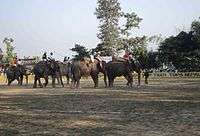Elephant polo
Elephant polo is a variant of polo played while riding elephants. It is played in Nepal, Sri Lanka, Rajasthan (India), and Thailand. England and Scotland regularly field teams. Equipment consists of a standard polo ball and six to ten foot cane (similar to bamboo) sticks with a polo mallet head on the end. The pitch is three-quarters of the length of a standard polo pitch, due to the lower speed of the elephants. Two people ride each elephant; the elephants are steered by mahouts, while the player tells the mahout which way to go and hits the ball.
Elephant polo originated in Meghauli, Nepal. Tiger Tops in Nepal remains the headquarters of elephant polo and the site of the World Elephant Polo Championships.[1]
Elephant Polo in Nepal and Thailand is played under the auspices of the World Elephant Polo Association. WEPA enforces strict rules regarding elephant welfare and game play. Other tournaments, such as those played in India and Sri Lanka, are managed independently of each other and the World Elephant Polo Association. Sri Lanka held an annual tournament in Galle under the auspices of the Ceylon Elephant Polo Association. In 2007 an elephant went on a rampage during a game, injuring two players and destroying the Spanish team's minibus.[2]
Allegations of cruel treatment of polo elephants, made by People for the Ethical Treatment of Animals, have led to match cancellation, sponsorship withdrawal and the removal of references to elephant polo records in the Guinness Book of World Records.[3][4][5]
See also
References
- ↑ "Bushell at elephant polo World Cup". BBC News. 5 December 2008. Retrieved 27 April 2009.
A team from England have become the new world champions of elephant polo. Air Tuskers beat Scotland's Chivas, on Friday in Southern Nepal.
- ↑ "Why you should never make an elephant angry". Adelaide Now via Daily Mail. February 16, 2007. Retrieved 2011-03-21.
The four-tonne, 2.8m pachyderm threw off his mahout and U.S. rider as the island's sixth annual elephant polo tournament got under way, rampaging off the pitch and attacking the Spanish team's minibus.
- ↑ Shukla, Richa (3 February 2011). "For the record: No elephant polo". Times Of India. Retrieved 17 October 2013.
- ↑ "'Cruel' elephant polo match cancelled in Jaipur". The Daily Telegraph. 21 August 2011. Retrieved 17 October 2013.
- ↑ "Elephant Polo Tournament Canceled in India Over Cruelty Concerns". The Jakarta Globe. Retrieved 17 October 2013.
External links
- Press Release from World Elephant Polo Association
- World Elephant Polo Association
- The Pukka Chukkas - Playing Elephant Polo to raise money for Tiger Conservation and Multiple Sclerosis charities
- Financial Times January 13, 2012 Elephant polo by James Crabtree
